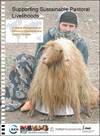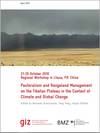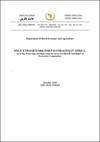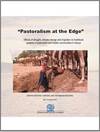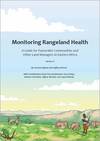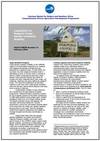Estas directrices han sido elaboradas para ayudar a los responsables de la toma de decisiones, que quizás no intervienen habitualmente en cuestiones relacionadas con el pastoralismo, a tomar mejores decisiones con respecto a las políticas e inversiones que afectan a los pastores y sus entornos. Si bien algo técnicas, pretenden simplificar asuntos complejos o polémicos en conceptos básicos más funcionales. Las directrices han sido diseñadas para ayudar a los expertos del desarrollo y la conservación a familiarizarse con los principios fundamentales del pastoralismo y con algunas de las oportunidades y limitaciones del desarrollo sostenible.
Year of publication: 2011Organization: Unión Internacional para la Conservación de la Naturaleza (IUCN)
Topic: Economía, Servicios ambientales, Seguridad alimentaria, Tierra, Organización, Participación
Language: العربية, 漢語, English, Français, Русский, Español
Type of document: Técnico
Geographical coverage: Global
“Nosotras, las mujeres pastoras reunidas en Mera, en la India, del 21 al 26 de noviembre de 2010, en representación de 32 países, nos hemos reunido para fortalecer alianzas e impulsar soluciones prácticas para problemas que nos afectan.”
“Presentamos esta declaración como un documento político para informar y apoyar de políticas pastoriles.”
Year of publication: 2010Organization: Autores individuales
Topic: Género y juventud, Participación
Language: English, Français, Español
Type of document: Políticas y legislación
Geographical coverage: Global
The regional workshops within the mountain development programme of InWEnt aim at addressing pressing problems of mutual interest among the participating partners by focusing on a specific topic. In 2010 two conferences on pastoralism were held in the framework of the mountain development programme. Complementing the series that started with the Khorog and Kashgar workshops in July the Lhasa gathering happened to be the final part with a special focus on pastoralism and rangeland management on the Tibetan Plateau. It seems to have been the appropriate timing to emphasize upon a pressing issue that is generating increased and rejuvenated interest in the debates on biodiversity, climate and global change. Planners are challenged by designing concepts for nature protection and resource management in order to implement “green policies”. Decision-makers keep in mind the dual challenges between livelihood improvement and natural resource management by translating and transferring it into modernisation programmes. Far-reaching policies that aim at a reconciliation between ecological necessities and economic demands are tested and implemented in a grand design. Especially the Tibetan Plateau is an arena where the term eco-shelter has become a specific meaning that is affecting the reconciliation between nature and society as well as leading to far-reaching transformations in settlement structures and economic strategies. Recent interventions have changed and modified pastoral practices, terminated and extinguished certain traditions and opened-up new hitherto unknown and unexpected opportunities for pastoralists on the Tibetan Plateau. On the vast Tibetan Plateau pastoralism and rangeland management are not only challenges for regional planning, both sectors offer a tremendous economic potential and are proof for the adaptive properties and resilience of pastoralists exposed to harsh environmental conditions and all kinds of changes.
Year of publication: 2010Organization: Autores individuales
Topic: Cambio climático
Language: English
Type of document: Técnico
Geographical coverage: Asia Central
The Policy Framework for Pastoralism in Africa is the first continent-wide policy initiative which aims to secure, protect and improve the lives, livelihoods and rights of African pastoralists. The policy framework is a platform for mobilizing and coordinating political commitment to pastoral development in Africa, and emphasizes the need to fully involve pastoralist women and men in the national and regional development processes from which they are supposed to benefit. The framework also emphasizes the regional nature of many pastoralist ecosystems in Africa and therefore, the need to support and harmonize policies across the Regional Economic Communities and Member States.
Year of publication: 2010Organization: Oficina Interafricana de Recursos Animales (AU-IBAR)
Topic: Seguridad alimentaria, Pueblos indígenas, Organización, Participación, Servicios sociales
Language: English
Type of document: Políticas y legislación
Geographical coverage: Norte de África, África Occidental, África Central, África Oriental, África Meridional
The purpose of this paper is to review demographic trends as well as settlement and service provision patterns using quantitative data, where possible, and drawing on experiences, evidence and lessons from the Horn and East Africa regions. It addresses some of the most salient issues around pastoral livelihoods, emphasising the need to improve understanding in efforts to promote the resilience of these livelihoods. This study recognises the complexity of the issues and does not aim to provide answers, but rather to highlight issues and pose questions that policy makers, politicians and other key stakeholders need to grapple with in order to put into practice measures to reduce risk and mitigate vulnerability.
Year of publication: 2010Organization:
Topic: Resiliencia, Servicios sociales
Language: English
Type of document: Técnico, Científico
Geographical coverage: África Oriental
This study examines the effects of climate change, drought and decreasing natural resources
amongst mobile populations, specifically pastoralists in the North Eastern and North Rift Valley provinces of Kenya. The study provides an evidence base and proposes programmatic interventions that would be implemented in collaboration with the regional governments and other key players to address conflicts over resources and increased migration to [peri] urban areas.
Organization: Autores individuales, Programa de las Naciones Unidas para el Medio Ambiente (UNEP)
Topic: Cambio climático, Pueblos indígenas
Language: English
Type of document: Técnico
Geographical coverage: África Oriental
This guide is written for people who want to design and implement a simple rangeland monitoring programme in Eastern Africa. It outlines a series of steps that will enable community members and other land managers to decide what, where, when, and how to monitor, as well as how to interpret and apply the results of their monitoring. The guide introduces a simple set of methods for collecting monitoring data using only a pencil, a stick, and a single datasheet.
Year of publication: 2010Organization: Autores individuales
Topic: Tierra
Language: English
Type of document: Técnico
Geographical coverage: África Oriental
Lessons from West Africa indicate cross-border mobility needs to be addressed within a comprehensive policy, legal and institutional framework that harmonizes national and regional legislation to secure livestock mobility from the local to the regional level. At regional level, the ECOWAS decision agreed in Abuja in October 1998 provides a regional framework for cross-border transhumance between fifteen member states.
Year of publication: 2010Organization: Mercado Común para África Oriental y Meridional
Topic: Conflicto, Participación
Language: English
Type of document: Políticas y legislación
Geographical coverage: África Occidental, África Oriental, África Meridional


